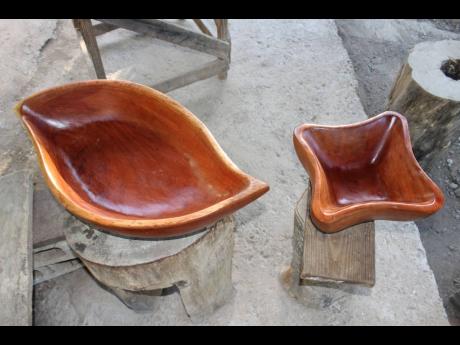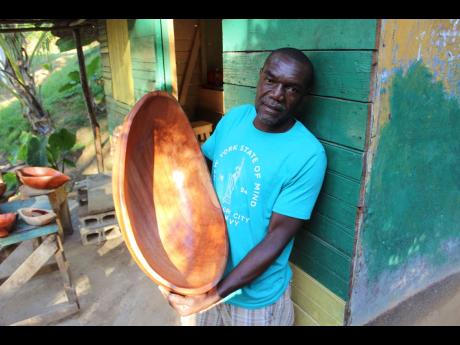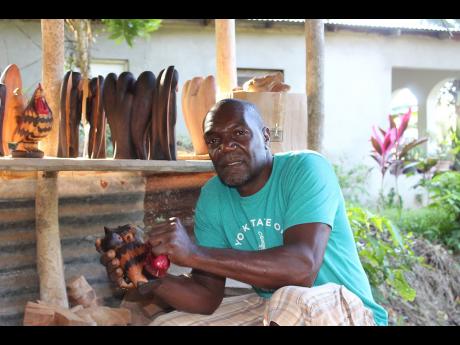Winston Joseph carving out a living and loving it
The Gleaner chanced upon Winston Joseph, who this writer met at an event sometime ago in St Andrew. It turned out that he was still creating eye-catching figurines made of wood, right there in his yard in Aleppo, St Mary.
In his humble workshop, there were wooden representations of fish, angels, owls, roosters, among others. They were at various stages of the production process, including some completed and ready to be sold mainly to tourists on the north coast. And while the aforementioned pieces are collectors’ items, Joseph’s bowls of various sizes and shapes are the ones that will force you to go find the money and buy them.
They generally look like fruit bowls, but they may also be used to store items like business cards, jewellery, stationery, hair accessories, sewing implements and cutlery.
Joseph started to make the bowls about 15 years ago, with the hotels being his major clients, and they are really the standouts in his stock. He has been a wood sculptor for about 35 years and says he has no intention of laying down his tools anytime soon.
However, wood sculpting was not part of his childhood aspirations. Joseph reconnected with his father at age 16 years old and discovered that the elder Joseph was a “brilliant artist”. However, he himself was not inspired at first to sculpt wood. Over time, however, the artisan in him was stirred to craft items depicting animals like roosters, fish, et cetera.
“It grow, grow until I found my footing, and then I started to push it,” he recalled. He then began to travel out of parish to sell his creations. A visit to a craft fair was an introduction to other marketing opportunities, and so fairs and other such events became his outlets. Even in times when sales were slow and the items were piling up, he still chiselled and carved “because the buyer will come”, eventually.
YOUTH NOT INTERESTED
But, beyond slow sales days, other challenges to his craft were acquiring the wood and some persons refusing to pay Joseph his asking prices.
He said both factors are equally important as he does not use the limbs and trunks of the cedar tree, his preferred wood, but the roots, which can be time consuming to unearth.
He said sourcing the raw material for his work invariably comes with a financial cost. From acquiring the roots to manifesting the items “is a lot of hard work. So you have to pay to get value”, he stressed.
It is this hard work, it seems, which deters youth in Aleppo from joining him in what can be a lucrative lifestyle. Farming is the main source of income and survival in this mainly linear settlement in southeast St Mary. Wood carving then could be an alternative, he reasoned, but intimated that the youth are not interested in that either.
He has tried with them, he said, but they do not have the creative mindset and the discipline. Even those who are inspired complain that it is too tiring and boring and they are not into sitting down for too long.
“There is joy in it, but you have to love art to feel the joy,” Joseph said. He is feeling that joy and said, as long as he is “up and running”, he will continue to carve and create. He would like to go as far as he can in the industry, he said.
He said artisans need recognition and is urging the Government to give attention to them and their work. Until then, however, he will continue to carve and eke out a living for himself and his family.



